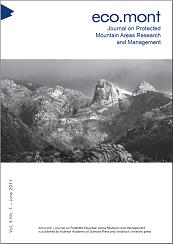Michael Jungmeier,
Ina Paul-Horn,
Daniel Zoller,
Falk Borsdorf,
Karin Grasenick,
Sigrun Lange,
Birgit Reutz-Hornsteiner
S. 29 - 36
doi:
10.1553/eco.mont-3-1s29
Verlag der Österreichischen Akademie der Wissenschaften
doi:
10.1553/eco.mont-3-1s29
Abstract:
The management of protected areas has recently emerged as a new scientific discipline. To date, there is a lack of systematic and theoretical background. This study explored this vast field by combining different disciplines in an inter- and transdisciplinary approach. Taking two existing Austrian biosphere reserves (Großes Walsertal BR, Wienerwald BR) and one national park (Nockberge NP, BR planned) as typical examples, we analysed basic management principles in terms of intervention, participation, regional governance and change management. The broad base and special methodological approach showed the complexity of planning and managing a biosphere reserve. How local stakeholders perceive the process of development very often differs from what the planning regime was meant to do. The overwhelming importance of regional history, the power of established structures and social components (trust, enthusiasm etc.) can turn planning intentions into an unpredictable direction. Only a precise and focused strategic mix of process components can ensure a successful process. What constitutes an effective mix differs from region to region and must be defined individually. It also became clear that different phases of BR development need specific management approaches as intervention takes place in a typical order. Once again, proper participation proved crucial for the success of a BR.
biosphere-reserve protected-area-management planning intervention participation governance change management
Published Online:
2011/05/20 07:12:24
Document Date:
2011/05/20 07:12:00
Object Identifier:
0xc1aa5576 0x0028b18b
Rights:https://creativecommons.org/licenses/by-nc-nd/4.0/
The journal “eco.mont” – Journal of protected mountain areas research and management – was published for the first time in June 2009.
The journal was founded as a joint initiative of the Alpine Network of Protected Areas (ALPARC), the International Scientific Committee on Research in the Alps (ISCAR), the Austrian Academy of Sciences (ÖAW) and the University of Innsbruck.
The journal aims to highlight research on and management issues in protected areas in the Alps without excluding other protected mountain areas in Europe or overseas. Its target audiences are scientists from all related disciplines, managers of protected areas and interested individuals including practitioners, visitors, teachers, etc.
The journal presents peer-reviewed articles in English by authors who research protected mountain areas and management issues within these areas. It's published twice a year as a collaboration of the Austrian Academy of Sciences Press – responsible for the e-version – and Innsbruck University Press – responsible for the print version.
Die Zeitschrift „eco.mont“ – Zeitschrift zur Forschung in Gebirgsschutzgebieten – erschien im Juni 2009 zum ersten Mal. Die Zeitschrift wurde auf Initiative des Netzwerks Alpiner Schutzgebiete (ALPARC), der Schweizer Akademie der Naturwissenschaften (ISCAR), der Österreichischen Akademie für Wissenschaft (ÖAW) und der Universität Innsbruck gegründet. Sie hat das Ziel, Themen zu behandeln, die gleichzeitig Forschung und Verwaltung in und über die Schutzgebiete der Alpen betreffen, ohne dabei andere Gebirgsschutzgebiete Europas oder anderswo auszuschließen. Diese neue Zeitschrift richtet sich an ein Publikum von Wissenschaftlern der verschiedensten Fachbereiche, an die Verwalter von Schutzgebieten und an alle sonstigen Interessierten, Praktiker, Besucher, Lehrpersonal etc. einbegriffen. Die Zeitschrift veröffentlicht begutachtete Beiträge auf Englisch von Autoren, die Fragen der Gebirgsschutzgebieten und deren Verwaltung forschen. Sie erscheint zweimal pro Jahr, auf der Basis der gemeinsamen Anstrengungen des Verlags der Österreichischen Akademie der Wissenschaften, der für die digitale Fassung verantwortlich ist, und der Presse der Universität Innsbruck, verantwortlich für die gedruckte Fassung.



 Home
Home
 Print
Print
 References
References
 Share
Share

